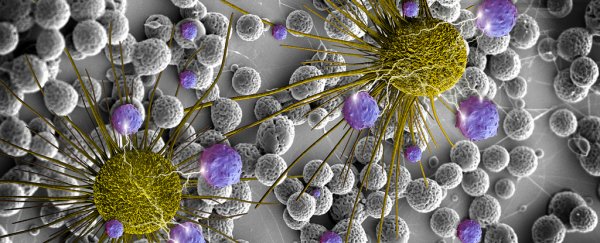Antibiotics aren't just good at treating infections - they may also be able to eradicate cancer stem cells, scientists have found.
Michael Lisanti, an oncologist from Manchester University in the UK, asked his daughter Camilla at the dinner table one night how she would cure cancer, Fiona Macrae reports for the Daily Mail. Her response? That she'd use antibiotics, "like when I have a sore throat".
Along with his wife, cancer researcher Federica Sotgia, Lisanti decided to try out the hypothesis, and discovered that some of the cheapest and most widely-used antibiotics can kill off a range of cancer cells - without harming healthy tissue.
After doing some initial research, the team decided to investigate a class of antibiotics that stop cells from making mitochondria - the organelle that provides energy to the cell - as a side effect.
Cancer stem cells, which trigger tumours and keep them alive as they spread throughout the body, have an unusually high number of mitochondria. So Lisanti and Sotgia thought that not only would these antibiotics be more likely to attack these cells, but they may also be able to stop them from growing.
They tested their hypothesis in the lab by treating cancer stem cells from seven tumour types around the body with common, FDA-approved antibiotics.
Surprisingly, they found that four of the antibiotics were able to kill off cancer stem cells taken from breast, prostate, lung, ovarian, skin, pancreative and brain tumours.
One antibiotic, known as doxycycline, which is often used to treat acne, was particular promising - and it costs only around 10 Australian cents a day, compared to the hundreds of dollars spent on current cancer treatments. Importantly, the antibiotics didn't harm healthy human cells.
Obviously, the results have only been achieved in the lab, and any new cancer treatment takes years of development. But they all start out similar to this, with a proof of concept experiment in vitro - and the team now believes there's enough evidence to test whether antibiotics could have a similar effect in cancer patients.
Publishing their results in the journal Oncotarget, the authors write: "Thus, we now propose to treat cancer like an infectious disease, by repurposing FDA-approved antibiotics for anti-cancer therapy, across multiple tumour types."
Matthew Lam, the senior research officer from Breakthrough Breast Cancer, the charity that helped fund the research, told Macrae that he hopes the research will now move into more extensive testing.
"The conclusions the researchers have drawn, while just hypotheses at this stage, are certainly interesting," he explained. "Antibiotics are cheap and readily available and if in time the link between their use and the eradication of cancer stem cells can be proved, this work may be the first step towards a new avenue for cancer treatment."
Camilla's parents acknowledged her idea by naming her as an author of the study. "I thought it was very naïve to think you could cure cancer with antibiotics," Lisanti told Macrae, "but at the end of the day Camilla was right."
Source: The Daily Mail
